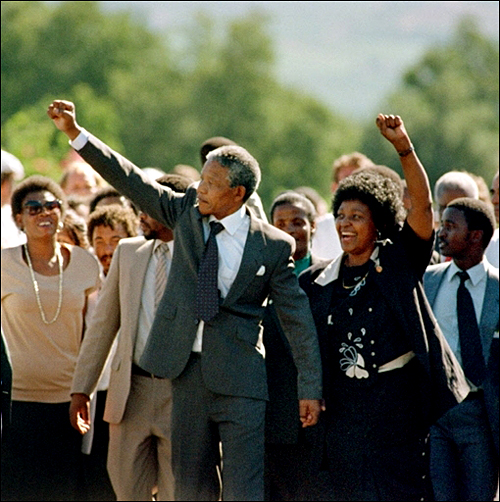Quote of the week
[T]he moral point of the matter is never reached by calling what happened by the name of ‘genocide’ or by counting the many millions of victims: extermination of whole peoples had happened before in antiquity, as well as in modern colonization. It is reached only when we realize this happened within the frame of a legal order and that the cornerstone of this ‘new law’ consisted of the command ‘Thou shall kill,’ not thy enemy but innocent people who were not even potentially dangerous, and not for any reason of necessity but, on the contrary, even against all military and other utilitarian calculations. … And these deeds were not committed by outlaws, monsters, or raving sadists, but by the most respected members of respectable society.
Eichmann in Jerusalem: A Report on The Banality of Evil
On Nelson Mandela
Today twenty years ago exactly Nelson Mandela was finally released from prison after serving 27 years of his sentence for life imprisonment. It was a very hot day in Cape Town and the 100 000 strong crowd was baking in the sun. Most of us either had no money to go and buy water or were too scared of losing our places close to the front if we left, but we were not going to miss this event for anything, so we stuck it out.
I was standing just to the left of the City Hall balcony next to a palm tree. At first, the crowd was friendly and festive, and I amiably chatted to the people around me – white and black, rich and poor – who had come to see Mandela give his first speech after his release. But as the minutes dragged into hours and the rumours spread – the regime had decided not to release Mandela after all; Winnie Mandela was refusing to come out of the prison; there was a right wing plot to assassinate Mandela – the crowd became restless.
 At some stage the pushing and shoving became dangerous and for a while I thought I was going to be crushed to death. Allan Boesak tried to calm the crowd, but it did not help. Ironically it was the looters that brought relief. At the back some hooligans had looted the liquor store and the police fired their guns. We all stopped pushing and ducked, peering carefully to see what the hell the Police were getting up to.
At some stage the pushing and shoving became dangerous and for a while I thought I was going to be crushed to death. Allan Boesak tried to calm the crowd, but it did not help. Ironically it was the looters that brought relief. At the back some hooligans had looted the liquor store and the police fired their guns. We all stopped pushing and ducked, peering carefully to see what the hell the Police were getting up to.
Two white woman – every hair in place, nails varnished, clearly not the usual struggle suspects – who were standing close to me started praying. “Vandag maak hulle ons nog vrek,” one whispered to the other (“Today they will kill us”) It was not clear whether they were referring to the Police or to members of the crowd.
When Mandela finally appeared on the balcony a huge roar went up. He delivered the speech, but I can remember very little of what he said. Now we were hugging each other and crying and laughing.
It had suddenly dawned on us while listening to this man: We were going to be free after all. It might take a year or five years, but the end of apartheid was inevitable.
Today twenty years later I still get a chill down my spine when I recall that day. I would not have missed it for the world. Today, again, it feels great to be a South African.
BACK TO TOP

